The UN in the eyes of New Yorkers
Al Jazeera gauges their views on how successful the world body has been.

 |
| The UN building has been a central part of the New York city skyline [EPA] |
The United Nations was founded in San Francisco in 1945 but has been headquartered in New York since 1950 when the Rockerfeller family, renowned American industrialists, donated the land and funds to construct the lavish building.
Since then, the UN building has been a central part of the New York skyline and entered American pop culture.
Keep reading
list of 4 itemsEurope pledges to boost aid to Sudan on unwelcome war anniversary
Birth, death, escape: Three women’s struggle through Sudan’s war
Does Israel twist humanitarian law to justify Gaza carnage?
However, the world institution it houses has received mixed responses from many Americans.
Some see the UN as an intrusive body which threatens US domestic policies.
Others say the UN gangs up on the US and its allies, most notably Israel.
Al Jazeera spoke with some New Yorkers and gauged their points of view about the international forum which has been in their midst for more than 58 years.
|
Steve Carter, managing partner in a real estate fund |
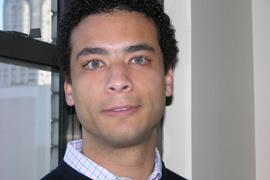 |
“Certainly the UN has not been nearly as effective as had originally been hoped within the context of its purpose to maintain peace in the world. That being said, the organisation has been a positive influence in the world theatre in a number of instances.
However, it would be a shame if the UN continued its existence without substantial reform in its structure and policies in order to provide it with a realistic chance of achieving its goal.
The organisation’s most debilitating weakness – and, ironically, to some extent, its greatest strength – is its inclusion, most particularly on the Security Council, of nation states that create regional instability if not outright war – the very cancer the UN is meant to cure.
Although ejecting belligerent – or more restrictively, non-democratic – states would do nothing more than create another regional security organisation akin to Nato, it is naive to believe that a substantially unreformed UN/Security Council will continue to be anything more than the ineffectual entity that it has been.
Although the UN cannot supersede national sovereignty, there is definitely a useful role for the UN.
However, its usefulness has to be defined in the light of its ability to do the following: mitigate, if not prevent, genocides like [that in] Darfur; avoid botched policies like those the UN adopted in the first few years after the Serbs’ attack on Bosnia; create a security regime that gives Lebanon space to define its own peaceful future; and be at the forefront of bringing a lasting resolution to the Israeli-Palestinian conflict.”
|
Jessica Packer, small business owner |
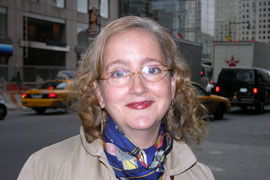 |
“Unfortunately the bureaucracy overweighs the intention of the organisation for which it was originally established.
The UN is much more about the budget and not so much about the programme it is there to fund.
The head of the United Nations Development Fund (UNDP) informed like four years that he was sitting on a budget of $7 billion but he was not able to apply any of the funds directly to any other programmes he had defined.
Once again the level of bureaucracy in the UN is removing its ability to actually accomplish any of the goals of the programmes it is there to take care of.”
|
Michael Mulligan, legal advisor in the financial banking sector |
“The UN is a big joke. If you think about all those people being killed in Africa because of despotism and dictators that send ambassadors to this building [he points to the UN building]. Why do they have to meet here?
What the United States should do is shut the UN down. Let it go somewhere else because it is so disrespectful to human beings.
That’s what I think about the UN. It’s a big government bureaucracy created by the world and it’s useless.
Look at the Congo right now, I really don’t see any future for the United Nations.”
|
Jean-Pierre Daccache, lawyer |
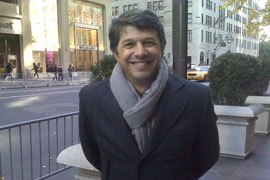 |
“The United Nations it seems has lost its way. Since it was established to enhance international relations, human rights, social progress, economic development, peace and security to name a few, the organisation looks totally out of touch with its own mission and seems unable to play a constructive [role] in international relations.
It is seldom taken seriously by the member states and resolutions issued by its General Assembly or the Security Council seem to fall on deaf ears more often than not.
In fact, often it seems that it is a hostage of the large donor countries that finance the organisation.
The example of the Darfur conflict is further proof of the UN’s inability or lack of will to step in and right what has become a large-scale human tragedy. This does not mean that I do not support the concept or the role the UN plays in the world.
It still acts as a moral compass in a world that is growing more and more polarised.
It has been playing a successful role in stamping-out various diseases through the vaccination programmes, at the very least it often provides programmes that are beneficial to children in poor countries and irrespective of their minimal impact such programmes often foster aggressive campaigns by private organisations alongside the UN.
Ideally, I would like for UN resolutions to have more teeth with punitive repercussions for their violators, but we are still far from such a goal.”
|
Philip Rafferty, sales executive |
“It is effective when it comes to international communication but when it comes to actually trying to change things. I think it’s a lot of people wasting time.
I think for the UN to have a future, I think we should take the United Nations and put [it] in a suite in the tallest building in the world, something similar to the trade center, and then you will actually see proper decisions being made.”
|
Robert Raspanti, construction project manager |
“When you have all these nations together, you’re always going to have a difference of opinion. But I think it keeps a lid on most of the stuff and it should do a better a job in Africa but other than that I think it does a pretty good job.
I think in the future it should have a greater humanitarian role than it has now. I think now it’s a little bit too political and loses track but you know I cannot imagine not having the UN there.
The world would be total chaos without it.”
|
Julia Payne, marketing executive |
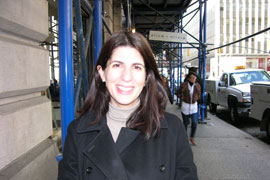 |
“The UN is a noble idea but it has mostly failed. For example the oil for food scandal, where billions were stolen from aid programmes, lots of corruption, inaction.
It feels like most of what the UN does these days is just condemn such as the genocide in Rwanda.
Also there is a lack of much-needed independence, with the US playing too big a role in shaping UN policies and there is way too much bureaucracy, leading again, to inaction.
I disagree with the fact that chairs of major UN bodies [are] selected for their nationalities, not their merits.
And these chairs are sometimes the heads of repressive regimes. So I think much reform is needed.”
|
Gerald Clerc, watchmaker |
“The events if the last few years have reminded us in a brutal way the need for a coordinated response to the world’s diplomatic and economic problems.
The United Nations and its affiliates in that sense is the only truly representative and respected world body that has a proven track record.”
|
Rafael Cesteros, gym instructor |
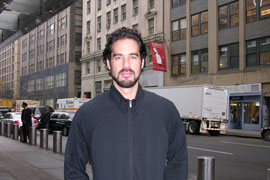 |
“I think the UN is an effective and valuable organisation that has helped decrease human right abuses, genocides, and [the] number of wars and has been a strong contributor in the decline of armed conflict in general since World War Two.
It has many administrative bodies, and some work more efficiently than others.
However, the UN has failed to implement resolutions related to the Israeli-Palestinian conflict, failed to provide humanitarian aid, deliver food, and prevent genocide in Rwanda and Darfur, among other shortcomings.
Since its not an independent organisation, in order to enforce any of its resolutions, all 192 members have to reach consensus.
You also have to wonder which countries have more pull in the UN’s decision-making process with the United States, UK, France, Russia and China being the only permanent member states, and how corrupt governments and high-profile global corporations may influence the UN’s operations. “